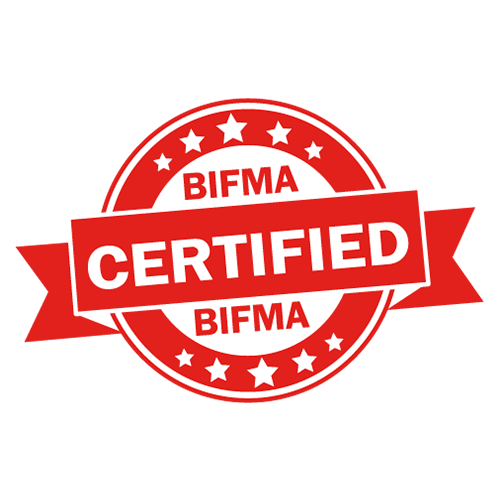
BIFMA (Business and Institutional Furniture Manufacturers Association) Certification is a comprehensive evaluation process that covers various aspects of furniture manufacturing, ensuring compliance with industry standards and promoting safety, sustainability, and social responsibility.
Here are some key areas addressed by BIFMA Certification:
Safety: BIFMA Certification verifies that furniture products meet safety standards to protect consumers from potential hazards and accidents.
Sustainability and Social Responsibility: Certification evaluates the environmental impact of furniture production, including factors such as resource usage, waste management, and social responsibility initiatives.
Durability and Strength: BIFMA Certification assesses the structural integrity and durability of furniture products to ensure they can withstand regular use and meet performance expectations.
Recyclability and Recycled Content: Certification examines the recyclability of materials used in furniture manufacturing and encourages the use of recycled content to minimize environmental impact.
Chemical Content and Emissions: BIFMA Certification regulates the use of harmful chemicals in furniture production and sets limits on emissions to promote indoor air quality and occupant health.
Reliability: Certification evaluates the reliability and performance consistency of furniture products to ensure they meet customer expectations and deliver long-term value.
Overall Quality: BIFMA Certification confirms that furniture products meet quality standards in design, construction, and finish to deliver a superior user experience.
Flammability and Electrical Components: Certification addresses fire safety concerns by testing furniture products for flammability and ensuring compliance with electrical component standards.
Material and Energy Efficiency: BIFMA Certification encourages the use of energy-efficient manufacturing processes and materials to minimize resource consumption and reduce environmental impact.
Environmentally Conscious: Certification promotes environmentally conscious practices throughout the furniture supply chain, from sourcing raw materials to end-of-life disposal.
By obtaining BIFMA Certification, furniture manufacturers demonstrate their commitment to producing high-quality, safe, and sustainable products that meet the needs of consumers while minimizing environmental impact.
Incorporating a startup in India usually involves several key steps. These steps typically include registering the business name, acquiring a Director Identification Number (DIN) and Digital Signature Certificate (DSC), preparing the Memorandum of Association (MoA) and Articles of Association (AoA), and submitting the incorporation documents to the Registrar of Companies (RoC).
Registering as an MSME brings forth a host of advantages, including access to government schemes and subsidies, priority sector lending, protection against delayed payments, eligibility for tax benefits, and expanded market opportunities.
A private limited company stands as an independent legal entity, affording its owners limited liability protection and accommodating multiple shareholders. On the other hand, a sole proprietorship represents an unincorporated business solely owned and managed by an individual, offering simplicity but lacking limited liability protection.
Indeed, obtaining a PAN (Permanent Account Number) is mandatory for incorporating a startup in India. PAN serves various tax and regulatory purposes, including opening a bank account, filing tax returns, and conducting financial transactions.
Absolutely, foreign nationals and Non-Resident Indians (NRIs) are permitted to incorporate a startup in India. However, specific conditions and regulatory prerequisites, such as obtaining requisite approvals, may be applicable depending on the nature of the business and the residency status of the foreign national.
Empowering Businesses for Unparalleled Success through Innovative Strategies, Dedication to Excellence, and Customized Solutions Tailored to Your Needs.
Note: Payments for services are only accepted in the name of Utkrasht Udhyog Seva Private Limited and the type of account is solely “Current Account” via NEFT/IMPS, RTGS , Razorpay and we do not accept payments on personal accounts or under any other name.
Chat with us